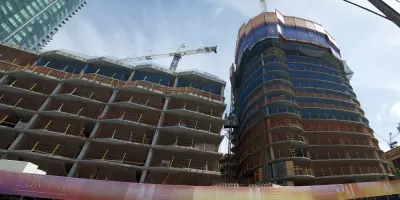While strict, suburban-style regulations often get a bad rap for the lack of housing in high demand cities, the red tape and other obstacles that delay development could be the worst culprit.

Dan Bertolet examines "one of the most important but overlooked causes of housing shortage: delay."
“Time is money,” goes the saying, and it’s the cardinal truth in the business of building homes. When a city’s regulations stretch the time from blueprint to move-in, the homes end up more expensive. Or they end up never built, because the delay makes them money-losers. In cities already suffering from a shortage of homes, either way, delay sends prices even higher.
Bertolet calls on existing research put a dollar figure to the cost of project approval delays in cities like Austin, San Francisco, and Seattle. In the latter's example, for a 135-unit apartment complex, "a two-month time reduction converts into a savings of $4,000 per unit."
Bertolet's analysis also digs into the issue of uncertainty, which is supposed to be a primary goal planning departments and land use regulations. Among examples of cities attempting to shorten time and increase certainty for development, Bertolet discusses the city of Portland's 2017 "Strategies for Accelerating Development," and the city of Seattle's expected changes to its design review process.
FULL STORY: HOUSING DELAYED IS HOUSING DENIED

Alabama: Trump Terminates Settlements for Black Communities Harmed By Raw Sewage
Trump deemed the landmark civil rights agreement “illegal DEI and environmental justice policy.”

Study: Maui’s Plan to Convert Vacation Rentals to Long-Term Housing Could Cause Nearly $1 Billion Economic Loss
The plan would reduce visitor accommodation by 25% resulting in 1,900 jobs lost.

Planetizen Federal Action Tracker
A weekly monitor of how Trump’s orders and actions are impacting planners and planning in America.

Wind Energy on the Rise Despite Federal Policy Reversal
The Trump administration is revoking federal support for renewable energy, but demand for new projects continues unabated.

Passengers Flock to Caltrain After Electrification
The new electric trains are running faster and more reliably, leading to strong ridership growth on the Bay Area rail system.

Texas Churches Rally Behind ‘Yes in God’s Back Yard’ Legislation
Religious leaders want the state to reduce zoning regulations to streamline leasing church-owned land to housing developers.
Urban Design for Planners 1: Software Tools
This six-course series explores essential urban design concepts using open source software and equips planners with the tools they need to participate fully in the urban design process.
Planning for Universal Design
Learn the tools for implementing Universal Design in planning regulations.
Caltrans
Smith Gee Studio
Institute for Housing and Urban Development Studies (IHS)
City of Grandview
Harvard GSD Executive Education
Toledo-Lucas County Plan Commissions
Salt Lake City
NYU Wagner Graduate School of Public Service





























